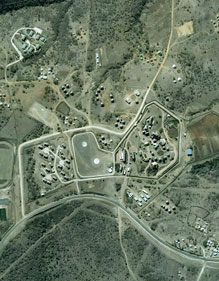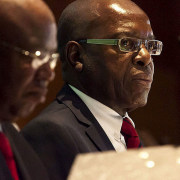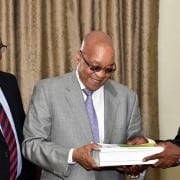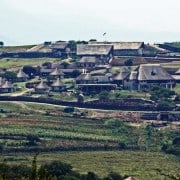|
Getting your Trinity Audio player ready...
|
Public protector Thuli Madonsela yesterday released her long awaited final report into the alleged irregular and excessive expenditure on security upgrades at Nkandla, President Jacob Zuma’s private residence in KwaZulu-Natal.
Madonsela’s investigation is not the first to have been conducted on the controversial construction project. In October 2012 public works minister Thulas Nxesi ordered an investigation into the upgrades – “in response to public concern that the cost estimates being mentioned seemed excessive, and allegations that the president had used state resources to build his private residence”.
That report was submitted in January 2013 and released publicly in December. By then Madonsela’s investigation was also under way – the first of seven complaints had been submitted to her office on 13 December 2011 and the last in November 2012. All were lodged under the Public Protector Act.
 Community excluded from Nkandla planning
Community excluded from Nkandla planning
The final report, titled Secure in Comfort, found that numerous items added to the president’s homestead, which had been built as security measures, were in fact not security measures at all under the legal framework, and added substantial value to the Nkandla property at no cost to Zuma.
Furthermore, some of these additions could have benefited the larger community of Nkandla, if implemented properly and with thought. In justifying the upgrades, the government’s submission to the public protector highlights the fact that Nkandla is in a remote area and sits in inhospitable terrain, so a helipad and health clinic had to be built closer to Zuma’s house.
These facilities did address a real need, said Madonsela, but the fact that they are located close to the residence rather than at a central place, provides no benefit to anyone but the Zuma family. The building of police staff quarters at the local police station, rather than right next to the Nkandla property, could have “left a legacy for the community”, she added, while situating the helipad near a rural hospital or police station could offer “enormous relief to this remote community”.
A report issued in November 2013 by the KwaZulu-Natal health department reveals that the Nkandla area remains “one of the most underserved in terms of the provision of health services, and greater effort is required for the improvement of service delivery to the community at large”. This would have been an ideal opportunity for the president to personally contribute to uplifting the community in terms of service delivery, as the dearth of services was one of the reasons advanced for the “unprecedented installations”.
Madonsela suggested that the private clinic could have been replaced with a mobile clinic, which was good enough for the late Nelson Mandela, or added capacity at existing local medical facilities. Instead, the main beneficiaries are the Zuma family, and Madonsela did not mince words in describing the substantial benefit they have derived from the multi-million building project.
Even the much-maligned swimming/fire pool could have played a nobler role – in evidence given to the public protector, former public works deputy minister Hendrietta Bogopane-Zulu stated that she suggested that the swimming pool could be used to teach children of the Nkandla community to swim. It could play a second role as a water reservoir – but she was removed from the project before her idea could be further considered.
Bogopane-Zulu also raised the idea of allowing the private clinic to serve the community as well, and requested the project team to ensure that the community component of the clinic not be paid for under the public works’ security project.
None of these developmental ideas were implemented. The government failed to “explore more economic and community inclusive options to accommodate the discretional security related needs”, Madonsela said. “During the president’s tenure and thereafter, the medical personnel deployed to the clinic will be idle most of the time. Their services could just as well have been utilised in the interest of the community of Nkandla, without jeopardising the medical care that has to be provided to the president.”
Corruption Watch shares this view – Zuma “placed personal and family interests above those of the public,” said executive director David Lewis yesterday.
Acting on complaints
The first public complaint asked the public protector to act on a Mail and Guardian piece published in November 2011, which claimed that Zuma’s residence was being upgraded at huge cost to the taxpayer. However, the flags had gone up long before – back in December 2009 the same newspaper queried the increasing expenditure. Apart from a statement from the Presidency denying that the state was footing the bill, says Madonsela, nothing appeared to have been done by the government to investigate the veracity of this earlier query or indeed to put measures in place to stop the cost escalation that the article said was already happening and would continue.
At that time the costs were estimated at R65-millon – already a substantial increase over the initial estimate of R27-million which resulted from two early security evaluations. Both were done by security experts in the SAPS, the first in May 2009, and the second in September 2010 after it had been discovered that Zuma was building three additional dwellings. In the meantime Nkandla had also been declared a national key point, which means that security upgrades at a place are to be implemented at the expense of the owner – but these provisions were never followed through.
Both assessments confirmed that the security measures at Nkandla were inadequate – but they suggested remedies that were in accordance with standard-setting documents, mainly the Cabinet Policy of 2003 and the Minimum Physical Security Standards (MPSS) of 2009. The procurement of the suggested measures was costed at the time by the Department of Public Works, whose responsibility it was to implement the upgrades, at R27-million.
Just a few years later the costs had ballooned to over R200-million, with the final figure approaching R250-million once phase three, which has not yet commenced, is completed – how did this happen? Madonsela’s investigation revolved around three main issues, as found in the complaints:
- Was there legal authority for the expenditure?
- Was the procurement process improper?
- Was the president’s conduct with regard to the upgrades unethical and in breach of the Executive Ethics Code?
Secure in Comfort addressed 12 issues:
- The legal authority for the installation and implementation of the security measures at Nkandla;
- The conduct of relevant authorities in terms of the procurement processes;
- The question of whether the measures undertaken by the Department of Public Works (DPW) went beyond the scope of what was required;
- The question of whether the expenditure incurred by the state was excessive or amounted to “opulence on a grand scale”, as alleged in one of the complaints received;
- Whether the president’s family benefited improperly from the upgrades;
- Whether there was maladministration by the public office bearers, officials and other parties involved;
- Whether funds were transferred from other DPW projects that might have needed them more;
- Whether Zuma is liable for some of the costs involved;
- Whether there were ethical violations on Zuma’s part in respect to this matter;
- Other maladministration issues that might have arisen;
- Indicators of systemic deficiencies regarding the administration of benefits to presidents and deputy presidents, and former presidents and deputy presidents.
Madonsela said her investigation was guided by three main pieces of documentation – the Cabinet Policy, the Minimum Physical Security Standards, and the two security assessments carried out in 2009 and 2010, which listed security features that were prescribed in terms of the first two instruments.
The findings in a nutshell
With regard to the 12 issues in question, Madonsela’s findings are as follows:
- Was there legal authority for state spending on Nkandla and, if so, was it violated or exceeded?
There was authority under the Cabinet Policy and MPSS, but its implementation did not comply with the parameters set out in the laws. The failure to follow procedures amounted to improper conduct and maladministration. - Did the state bodies involved in Nkandla violate supply chain rules or act improperly?
Yes – they “failed dismally” to follow procurement procedures. They also failed to comply with the Government Immovable Asset Management Act. Madonsela concluded that the conduct of all organs of state involved was unlawful and constituted improper conduct and maladministration. - Did the Nkandla upgrades go beyond what was required for the security of the president?
Yes, this applies to several buildings and other items constructed and installed. Some of the measures, said Madonsela, can “be legitimately classified as unlawful” as they are not provided for in the regulatory instruments, nor were they the most cost effective solutions. The buildings in question include the construction inside the president’s residence of a visitors’ centre, an expensive cattle kraal with a culvert and chicken run, a swimming pool, an amphitheatre, marquee area, some of the extensive paving, and the relocation of neighbours who used to form part of the original homestead, at an enormous cost to the state. - Was the expenditure excessive?
It was “was unconscionable, excessive, and caused a misappropriation of public funds”. - Did the president, his family and relatives improperly benefit from state spending on Nkandla?
They did, although Madonsela found no evidence that his brothers benefited improperly. However, Zuma’s property benefited from the substantial value added to it, and the family also derived improper benefit from measures such as the swimming pool, kraal and private medical clinic. - Was there maladministration in the Nkandla project?
There was. All the ministers supplied incorrect information on the legal authority for and extent of the upgrades. Some officials in the SAPS and the departments of defence and public works were unfamiliar with the authorising instruments, while others were guilty of improper conduct and maladministration. - Was there political interference in the project?
There was, although Madonsela found that it may not have been intended as such. The involvement of high-ranking politicians appeared to have created a sense among lower-ranking employees that there was political pressure on them, and they acted accordingly. - Were funds diverted from much-needed government projects to fund Nkandla?
Yes, funds were reallocated from the inner city regeneration project and the dolomite risk management programme. This was unconstitutional and also violated the Batho Pele White Paper. - Is Zuma liable for some of the costs incurred?
Madonsela said that Zuma could still be held to the declaration of Nkandla as a national key point, which makes the owner of a property liable for security upgrades. However, she determined that he should repay a reasonable part of the expenditure on non-security items. - Is Zuma guilty of ethical violations?
Zuma did breach the Executive Ethics Code, but Madonsela accepted that when he declared before Parliament that his family had built their houses and not the state, he was not thinking about the extras. However, in not pursuing the matter of rising costs right from the beginning, and by not asking questions about the scale and scope of the project, he failed to protect state resources and is therefore in violation of the code. - Were there other, more general, maladministration issues?
Yes – the state has occupied land next to the homestead without signing a lease agreement. This is a violation of the requirements of the Ingonyama Trust Act. Also, the questionable conduct of some of the people involved caused delays in concluding the investigation. - Is there a problem with the rules regarding the benefits due to presidents and their deputies, as well as former holders of office?
Yes, Madonsela identified a number of policy gaps and administrative deficiencies in the regulatory framework. Unless these are addressed, she said, the Nkandla saga could be repeated.
What about the task team report?
The DWP task team started its work at the beginning of November 2012 and submitted its report in January 2013. Its terms of reference were narrower the public protector’s report which, in contrast, took two years to conclude.
The task team found that:
- allegations that Zuma had used state resources to build or upgrade his personal dwellings were unfounded;
- there was a preliminary finding of the possibility of inflated prices and overcharging;
- the actual security upgrades cost approximately R71-million. Approximately R135-million was spent on operational needs, listed in the report as facilities such as accommodation for security personnel, medical facility, crew pavilion, helipad, roads and earthworks, which the security personnel need to perform their duties;
- there were a number of supply chain irregularities in respect of the appointment of service providers and procurement of goods and services.
The most significant difference between the two reports is that the task team report exonerates Zuma but Madonsela found that he derived “substantial benefit” from the extensive upgrades and non-security items.
The task team report also declared items such as the chicken coop, swimming pool (referred to by the DPW as the fire pool) and visitors’ centre as essential and legitimate security-related items, whereas Madonsela found that they did not comply with the legal guidelines.
The findings of the task team into the procurement issues were mostly in line with those of the public protector. The task team found that the process for the security upgrades was flawed and unconstitutional, as no open tender process was held.
In its recommendations the task team said, among others, that:
- Parliament must review the National Key Points Act;
- A departmental policy must be developed for prestige projects (such as Nkandla);
- A cost apportionment must be done to determine which cost should be allocated to which stakeholder;
- Irregularities identified must be further investigated and any professionals who might be found to have acted unethically must be reported to the relevant professional bodies and/or institutions;
- Immediate disciplinary measures must be instituted against any government officials who might be implicated in any kind of wrongdoing, including the flouting of policies and procurement procedures;
- The role of the former minister and deputy minister of public works in the project must be clarified and investigated.
Madonsela’s recommendations
The public protector made numerous recommendations which focused on compliance with processes, understanding of procurement processes, and ethical and accountable behaviour. They include, among others, that:
- Jacob Zuma is to determine the reasonable cost of the non-security measures, and pay a reasonable percentage of the cost of those measures. He is asked to reprimand the ministers involved for the “appalling manner” in which they handled the Nkandla project;
- Zuma must report to the National Assembly on his comments and actions on Secure in Comfort within 14 days;
- Other recommendations included a review and update to the Cabinet Policy and the creation by the Department of Defence of standard operating procedures in respect of benefits given to presidents and deputy presidents, and former presidents and deputy presidents;
- There was a strong educational component too – Madonsela recommended that Cabinet ministers familiarise themselves with the parameters for executive benefits and the accompanying responsibilities, and that the national police commissioner assist the minister of police in familiarising himself with the contents and provisions of the National Key Points Act;
- The minister of police is also to review the National Key Points Act to ensure it is aligned with the Constitution;
- Officials involved from all state departments are to be investigated to determine why the procedures were not followed, and must be subjected to disciplinary procedures as necessary;
- The Department of Public Works is to determine the extent of the over-spending and take steps to recover the money wasted. It must also urgently enter into a proper lease agreement with the Ingonyama Trust.
Madonsela also asked for remedial implementation plans to be lodged with her office, with intermediate status reports and final reports following up.








